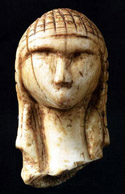Anthropology, Department of

Department of Anthropology: Faculty Publications
Document Type
Article
Date of this Version
May 2006
Abstract
Our study addresses these issues in a sociological microcosm that makes questions about population aging particularly interesting. The group on whom we report are the Ju|'hoansi (!Kung) of western Ngamiland, part of the Kalahari Desert of Botswana. They constitute a noteworthy case for several reasons. Discussion of modernization and its impact on the lives of elderly in traditional society has focused most often on agricultural and peasant societies, rather than on economically simpler groups such as hunter gatherers1). Ju|'hoansi, though now living in permanent settlements, have a recent past of mobile hunting and gathering. Over the past sixty years, Ju|'hoansi have experienced serious social disruption, a fact far from unique in less developed parts of the world. However, in the case of the Ju|'hoansi, during this period of change anthropological reports and research have accumulated, making it possible to make comparisons of "before" and "after" concerning aspects of old people's lives. In this paper we compare changes in adult longevity measured at two time intervals, 1968 and 1988, and ask, "Has sedentism and population aggregation improved or worsened chances for a long life?" Although life tables and census age distributions are not available from official sources for this remote area, the authors compare changes in the co-survivorship of adult children and their parents at the two intervals. During these two decades the many social forces that had been gathering during the mid 20th Century to bring about the end of full time hunting and gathering reached full expression. By the late 1980s, all the Ju|'hoansi of northwestern Botswana were effectively settled and making only limited use of hunted and gathered foods. Some people experimented, mostly unsuccessfully, with animal husbandry and crop raising, and all were experiencing a type of rural poverty brought on by population concentration, inability to pursue their traditional economy, and increasing contact with economically superior ethnic groups.


Comments
Published in Senri Ethnological Studies no. 70 (2006), pp. 81-100. Published by the National Museum of Ethnology, Osaka, Japan. Used by permission.